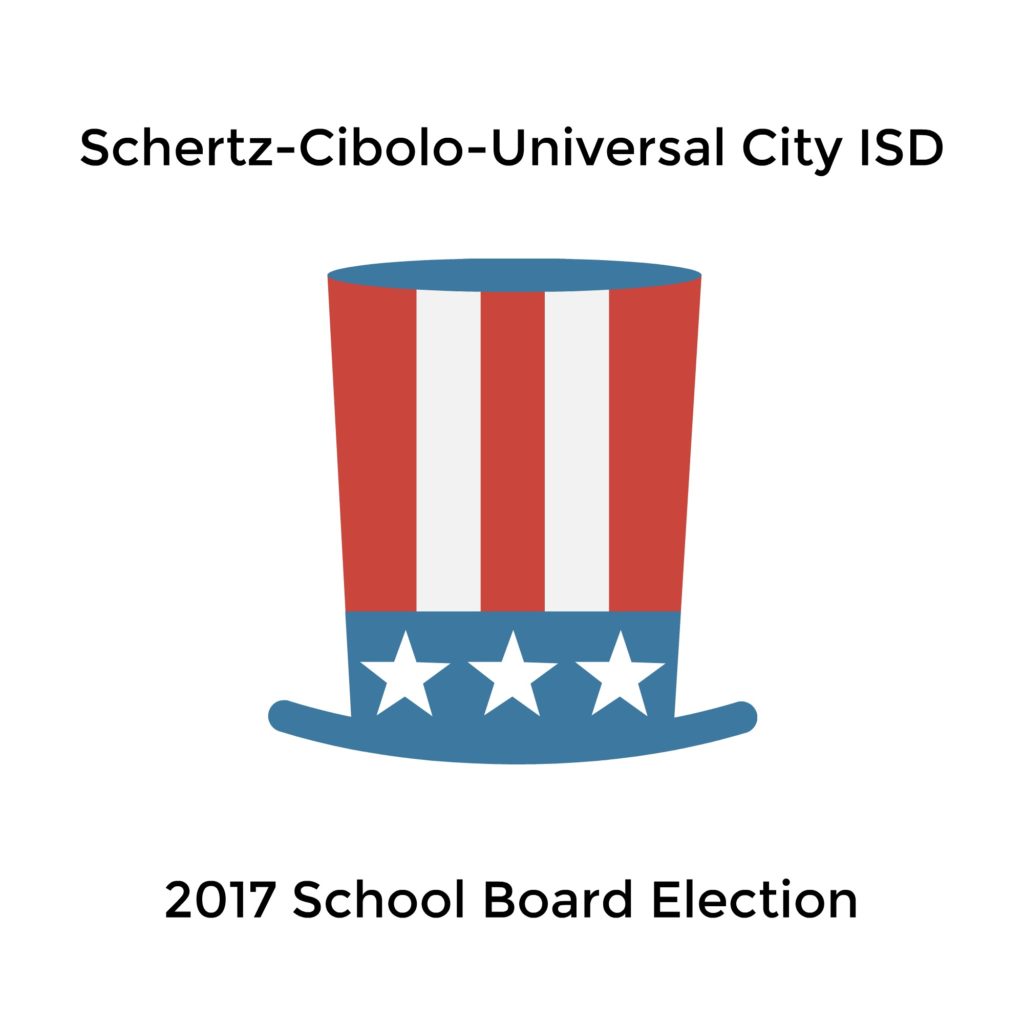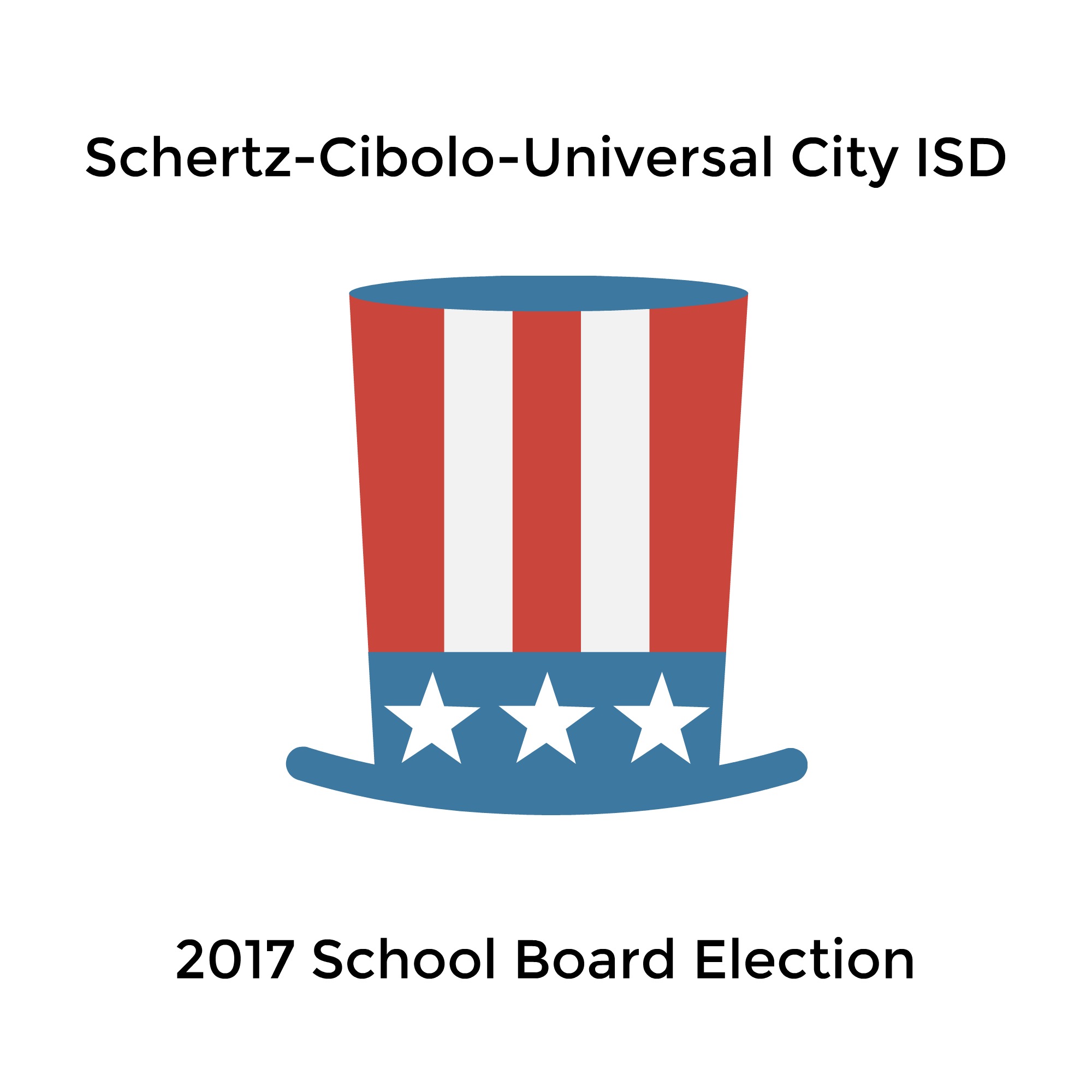
Schertz-Cibolo-Universal City ISD (SCUC) is the only independent school district in the San Antonio area with a contested school board election on November 7, 2017. The SCUC election is an opportunity to gain insight into local voters feel about education issues, including how to raise and spend money, how to improve education outcomes, and how to function within state mandates.
SCUC is located northeast of San Antonio, covering parts of Bexar and Guadalupe counties. Over the past several decades, the area has been transforming from rural to suburban, and that rapid population growth is likely to continue. SCUC is already one of the highest-performing districts in the region, based on 2017 accountability data.
Three candidates are running for Place 5 on the SCUC board of trustees:
- Gary W. Inmon, the incumbent, an attorney and consultant
- Grumpy Azzoz, a restaurant owner and former Schertz city council member
- Charles Huff, a retired Air Force pilot and an independent insurance agent
I reached out to the candidates to learn more about their issues and positions. I spoke on the phone with Huff and Inmon; Azzoz did not respond in time for publication.
Inmon’s Case for Continuity
Inmon has deep roots in SCUC: he was a student there in the 1980s, has served on the SCUC board for 17 years, and is currently in his second term as board president. “I’ve attended hundreds of board meetings, and made thousands of public votes. I have a public track record,” he added.
SCUC has recently earned statewide recognition for success. It was one of five school board finalists for the 2017 H-E-B Excellence in Education awards. In 2016, Superintendent Greg Gibson was one of five finalists for Superintendent of the Year, selected by the Texas Association of School Boards. Also, every campus in SCUC has met state testing standards for the last three years. (According to the Rivard Report, the only other districts in Bexar County to have done so are Alamo Heights ISD, Northside ISD, and South San Antonio ISD.)
Inmon described the board’s style as a “professional, team-oriented approach.” He said they have worked well together for over ten years, with a focus on kids and taxpayers. “We do not do drama or petty personal politics. We strive for good governance and continuous improvement,” he said. Asked about the SCUC board’s success by the Rivard Report, Inmon described it as “boring”—but in a good way.
“Success is a double-edged sword,” said Inmon, because it attracts families to the area, and rapid growth is a challenge. The board expects SCUC enrollment to reach 40,000 to 45,000 students within 20–25 years. The district is mostly rural and residential, not commercial, and so it is not a property-rich area. Nevertheless, trends in statewide politics have meant that more of the financial burden of public education is being carried by local property tax payers.
Inmon considers himself a fiscal conservative and is concerned about the tax burden on property owners in the district, but says the district needs to find the money for facilities and teachers. He pointed to SCUC’s football stadium, which is older and smaller than others in the area, as proof of cautious spending habits. Meanwhile, SCUC pays teachers some of the highest salaries in the area; Niche ranks SCUC high on its list of best places to teach (and pay is an important factor).
Huff’s Argument for Change
During the campaign, Huff has challenged Inmon’s character to serve as a trustee. Specifically, Huff pointed to a disciplinary action by the State Bar of Texas, which suspended Inmon’s license to practice law for one year as a result of a fee dispute with a former client.
For the substance of his campaign, Huff has focused on “where the rubber meets the road,” as he put it in our conversation, and wanted to skip the “rubbish—anything that gets in the way.” Huff ‘s model of education is “a good teacher looking students in the eyes and imparting knowledge.”
Huff described how his background qualifies him to be a SCUC trustee. He served 21 years as a fighter pilot in the Air Force, including recognition as Instructor Pilot of the Year at Randolph. After retirement, Huff taught language arts and speech, and served as a debate coach and football coach, in Oklahoma City and Fort Gibson, Oklahoma, and at John Jay High School in Northside ISD in San Antonio.
What would Huff change about SCUC? He expressed concern about bullying and drug use—”rubbish” that gets in the way of education. Also, Huff expressed concern for students who may be getting left behind. As an example, Huff cited the district’s goal that 90 percent of third grade students should be reading on grade level or better. “That goal should be 100 percent. The actual number is 76 percent. That means a quarter of students are not at grade level. What’s our plan? Because this is not satisfactory.”
Huff related two stories that show compassion for students who are in need or who are struggling. When he was a high school debate coach in Fort Gibson, Oklahoma, he met a student who was an immigrant from Puerto Rico. At first, she thought she was in the wrong class, but then she decided, “No, I want to be here.” It was an adjustment, but studying debate also taught her college-level vocabulary and reading, as well as how to be flexible and think about both sides of an issue. The next year, she was the Oklahoma state champion in debate; later, she earned a full-ride scholarship at the University of Tulsa and became a lawyer. Huff recalled that she never used notes—she always spoke from memory.
Another story Huff shared was about a language arts student. Huff recalled a boy who was not participating in class and was getting low grades. He was receiving special education services and had a history of abuse and depression. Then, the student saw a picture in the paper of the debate team. He decided he wanted to join, but first he had to bring his grades up to a 3.5 GPA. With hard work, he did—all the way up to 3.8. Huff said the student “emotionally and mentally exploded.” For Huff, that kind of student-teacher connection is the core of education.
Continuing to Improve
SCUC is already one of the most successful school districts in the San Antonio area, but how will it adapt to future challenges such as leadership changes, population growth, and competition from public charter schools?
Superintendent Gibson has announced plans to step down in 2019, and the SCUC board that forms after this election will have the important job of choosing his successor.
Both candidates discussed how the parents who live in SCUC—and the folks who don’t have kids, but care about an educated workforce—have rising expectations about the quality of education the district should provide. Inmon observed how voters are more willing now than they were in the past to approve school bonds for projects like constructing new schools to relieve overcrowding. Huff expressed concern at the district’s repeated requests for construction funds, but said he would “keep an open mind” and look at the data to find out why.
Inmon expressed pride in SCUC’s extracurricular activities like clubs, band, and sports. He hopes that those activities will keep kids involved and coming to school so that they can reap the academic benefits. When I asked Inmon about how SCUC tries to close the achievement gap for students who are falling behind, he described testing to identify students in need, free tutoring, after-school programs, summer school, and the district’s alternative campus, Allison L. Steele Enhanced Learning Center.
Both Inmon and Huff accept that SCUC will face growing competition from public charter schools. Founders Classical Academy of Schertz, as discussed in this earlier post, opened in the area in 2016, and is already performing well and building waiting lists of students trying to enroll. Inmon said, “We are prepared to play in a competitive environment,” and continued rapid growth in enrollment shows that parents are choosing SCUC schools. The board is looking at other ways to innovate, including forming an in-district charter school in the former campus of Rose Garden Elementary and investigating whether to become a District of Innovation.
SCUC Place 5 Race in Context
Place 5 is the only contested race on the SCUC board this November; three other candidates are running unopposed:
- Place 4: Edward Finley—a former trustee, running for an open seat; Mark Wilson is retiring
- Place 6: David Pevoto, incumbent
- Place 7: Amy Driesbach, incumbent
SCUC may be the only contested school board election in the region in November 2017, but as you can see from the latest school board guide, there will be many more elections in May 2018, and even a few in November 2018. Some of those are likely to be contested, and will provide another opportunity to explore how San Antonio-area voters feel about education issues.
Inmon’s long record of service to SCUC, and the district’s recent statewide recognition for board and superintendent leadership, make a case for voters to grant him another term. Huff’s concerns about staying focused on student-teacher interaction and avoiding the “rubbish,” as well as addressing population growth and achievement gaps, raise important questions about the district’s choices in the future. My hope is that voters will engage with the issues in this race and turn out to express their choice.
Read more:
- “Area school board president draws two challengers,” Lauren Caruba, San Antonio Express-News, October 28,2017
- “SCUC superintendent Gibson says he’ll retire in 2019,” Lauren Caruba, San Antonio Express-News, October 27, 2017
- “Bexar County ballot features mayoral and council races, several state amendments,” Jasper Scherer, San Antonio Express-News, October 21, 2017
- “Texas’ Best School Boards are ‘Boring,’ and That’s the Way They Like It,” Bekah McNeel, Rivard Report, May 25, 2017
- “Law license of SCUC school board president suspended,” Alia Malik, San Antonio Express-News, March 17, 2017
- “SCUC in the running for best school board in Texas,” Alia Malik, San Antonio Express-News, March 17, 2017
